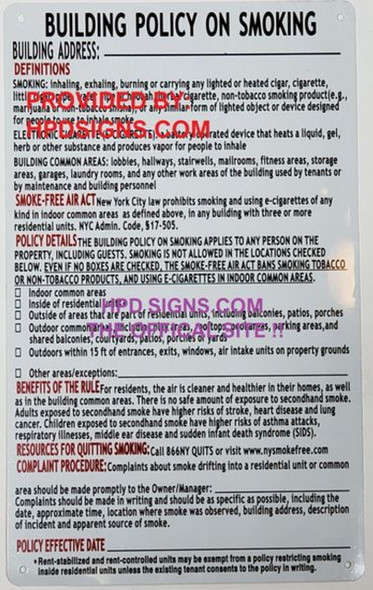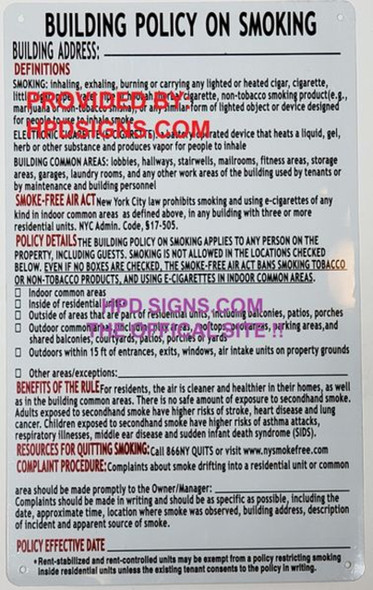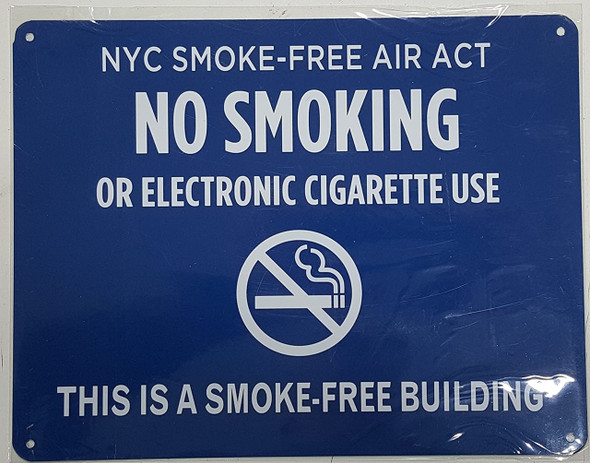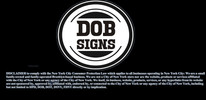NYc Disclosure of Policies on Smoking in Residential Buildings (pdf)
- SKU:
- UPC:
- MPN:
- Availability:
- USUALLY SHIP WITH IN 1-2 BUSINESS DAY
Description
New York City Disclosure of Policies on Smoking in Residential Buildings: Understanding Local Law 147
New York City’s Local Law 147, enacted in 2017, represents a key step toward transparency in residential living environments, particularly regarding smoking policies. Local Law 147 requires residential property owners to disclose smoking policies to tenants. The law applies to all Class A multiple dwellings, which includes most residential apartment buildings in NYC. The goal of the legislation is to mitigate the adverse effects of secondhand smoke, provide prospective tenants with essential information for decision-making, and promote a more health-conscious and informed rental market.
Legal Overview of Local Law 147
Local Law 147 is codified in the New York City Administrative Code, under §17-506.1, a part of the city’s public health and safety regulations. The law mandates that owners of residential buildings with three or more units adopt a written policy on smoking within their buildings. Notably, Local Law 147 does not dictate specific rules regarding smoking but instead emphasizes transparency and the tenant’s right to know.
The law addresses secondhand smoke’s well-documented negative health impacts, especially in multi-unit housing where smoke may travel between units, potentially affecting the health of non-smoking residents. NYC’s approach, unlike other jurisdictions that may impose outright smoking bans in residential buildings, is to ensure tenants are aware of policies in place so they can make informed choices.
Key Provisions of Local Law 147
Local Law 147 contains several critical provisions that apply to landlords and building owners in New York City:
1. Policy Adoption Requirement
- Mandatory Policy Disclosure: The law requires that property owners establish a clear, written smoking policy that applies to the building as a whole. This policy must specify where smoking is permitted or prohibited, including whether smoking is allowed in common areas, individual units, balconies, rooftops, and other areas.
- Definition of “Smoking”: Local Law 147 adopts an expansive definition of smoking, encompassing not only traditional tobacco smoking but also the use of electronic cigarettes and vaporized nicotine products. This broader scope aligns with recent studies highlighting the health risks of secondhand vape smoke.
2. Policy Disclosure and Distribution Requirements
- Written Disclosure to Current and Prospective Tenants: Landlords and property owners are required to disclose their smoking policies in writing. This disclosure must be provided to current tenants when the policy is initially adopted or changed, and to prospective tenants before signing a lease.
- Inclusion in Lease Agreements: For added transparency, Local Law 147 mandates that the smoking policy be incorporated into lease agreements, making it part of the binding contract between the tenant and landlord. Including this policy within the lease provides a level of enforceability and gives tenants recourse if policies are not followed.
3. Building-Wide Posting of Smoking Policy
- Posting in Common Areas: Building owners must publicly post the smoking policy in common areas, ensuring that all tenants and visitors are aware of the building’s smoking regulations. This is particularly important for buildings where smoking may be allowed in certain areas, as it clarifies designated smoking zones and reduces potential misunderstandings or conflicts between tenants.
4. Notification to the Department of Health and Mental Hygiene (DOHMH)
- Although there is no mandatory requirement to report the policy directly to DOHMH, the department has enforcement authority to ensure compliance with Local Law 147. Building owners are subject to inspections and must demonstrate that they have a smoking policy in place and that they disclose it appropriately.
5. Impact on Cooperative Housing and Condominiums
- Policy Requirements for Owner-Occupied Units: In cooperative (co-op) housing and condominiums, boards are required to adopt a smoking policy and disclose it to shareholders and unit owners. They are also responsible for ensuring that policy information is available to prospective purchasers. Although these settings may differ from rental buildings in terms of governance, Local Law 147 brings similar transparency expectations to all multi-unit residential properties in NYC.
6. Compliance and Penalties
- Fines for Non-Compliance: Failure to comply with Local Law 147 can result in penalties. While the fines for non-compliance are relatively modest, ranging from $100 to $500, repeated violations could lead to larger fines and further enforcement action by the DOHMH. The intent behind these penalties is more corrective than punitive, aiming to encourage compliance through awareness rather than severe economic penalties.
Legal Implications of Local Law 147 for Tenants and Landlords
Local Law 147 does not grant tenants an automatic right to a smoke-free environment; instead, it provides tenants with essential information to make choices that align with their health and lifestyle preferences. However, if a tenant experiences issues with secondhand smoke due to inadequate disclosure or failure to implement the policy, Local Law 147 can serve as a basis for legal action, especially if the landlord’s non-disclosure materially impacts the tenant’s health or use of the premises.
For landlords, Local Law 147 is an obligation but also a shield against liability. By transparently disclosing smoking policies, landlords reduce the risk of disputes related to smoking and secondhand smoke. Furthermore, it shifts some responsibility to tenants, who cannot claim ignorance regarding smoking policies if properly disclosed.
Health Impacts and Policy Rationale
Local Law 147 is underpinned by a substantial body of research on the health impacts of secondhand smoke, particularly in multi-unit housing. Studies have shown that smoking in one unit can lead to smoke infiltration in neighboring units, exposing non-smokers to similar health risks as smokers. In children, elderly adults, and those with pre-existing respiratory conditions, secondhand smoke exposure can exacerbate health conditions and contribute to the development of new respiratory and cardiovascular issues.
In addition to tobacco smoke, the law’s inclusion of electronic cigarettes reflects recent findings that secondhand aerosol emissions from vaping devices contain potentially harmful substances, including nicotine, heavy metals, and ultrafine particles, which can adversely affect indoor air quality.
Challenges and Criticisms
Local Law 147 has been met with both support and criticism. Proponents argue that the law fills an information gap, empowering tenants with knowledge and promoting public health. Critics, however, suggest that the law does not go far enough in protecting non-smoking tenants, as it stops short of imposing a building-wide smoking ban. Additionally, critics contend that enforcement is insufficient, as the DOHMH relies on complaint-driven investigations, which may limit the law’s effectiveness in some settings.
Potential Future Directions
Given evolving attitudes toward smoking and heightened public health awareness, it is conceivable that future legislation could impose stricter requirements on residential smoking, particularly in densely populated urban environments like New York City. Legislative actions could range from mandating smoke-free buildings, especially in vulnerable communities, to expanding enforcement mechanisms for Local Law 147.
Moreover, Local Law 147 could serve as a foundation for other cities, especially those with a significant number of multi-unit housing residents. Similar transparency-based policies could encourage an informed tenant market, thereby creating a competitive incentive for landlords to adopt smoke-free policies without direct government mandates.
Summary and Conclusion
Local Law 147 represents a nuanced approach to managing smoking in residential buildings by prioritizing tenant awareness and property owner responsibility. It reflects NYC’s dedication to public health and transparency in housing without imposing strict smoking bans. Although the law has its limitations, it has contributed to a more transparent rental market in NYC, allowing tenants to make choices based on informed preferences and health considerations. The law also aligns with broader urban health trends and may inspire further action on smoking policies in multi-unit housing, both within NYC and nationwide.
Legal DISCLAIMER DISCLAIMER ON LEGAL CODES DISCLAIMER ON SIGN USE GENERAL INFORMATION DISCLAIMER
We are a small, family-owned and family-operated Brooklyn-based business. We are not a City of New York store, nor are our website, products, or services affiliated with the City of New York or any agency of the City of New York. Neither we, nor our business, websites, products, services, or any hyperlinks from our website are sponsored by, approved by, affiliated with, endorsed by, or connected to the City of New York or any agency of the City of New York, including but not limited to HPD, DOB, DOT, DSNY, FDNY, or any federal entity, directly or by implication.
The codes, regulations, and requirements referenced on our website may not represent the most recent or updated versions. State, federal, or local regulatory agencies may have more current or accurate information. We make no warranties or guarantees about the accuracy, completeness, or adequacy of the information provided on this site or linked from it. Customers should verify all information by reviewing the official sources directly.
The requirements for sign content depend on intended use and applicable laws. The buyer is solely responsible for determining the appropriate content for a sign or package of signs. We make no warranty or representation regarding the suitability of any sign for a specific application. It is the customer’s responsibility to ensure that the signs ordered are in compliance with all applicable state, federal, local, and municipal laws. Customers are encouraged to carefully review our Terms and Conditions prior to purchase.
All content on this site is provided for informational purposes only and does not constitute legal advice, professional advice, or a definitive statement of law. For guidance on specific requirements, customers should consult the laws and regulations referenced, as well as any rules applicable in their jurisdiction. You may wish to consult with an attorney or qualified professional to ensure compliance with all applicable legal obligations.
Related Products
Related Products

HPD Residential Building smoke Policy Disclosure Sign ( Local Law 147)-black

HPD Residential Building smoke Policy Disclosure Sign ( Local Law 147)-El blanco Line

Residential Building Smoke Policy Disclosure Sign – Local Law 147 Compliance | HPD Required Lobby Sign (White, 8.5x14 Inch, Aluminum, Wall Mount)

NYC Smoke Free Act Sign"No Smoking or Electric Cigarette Use" - This is A Smoke Free Building (8.5x11, White)















